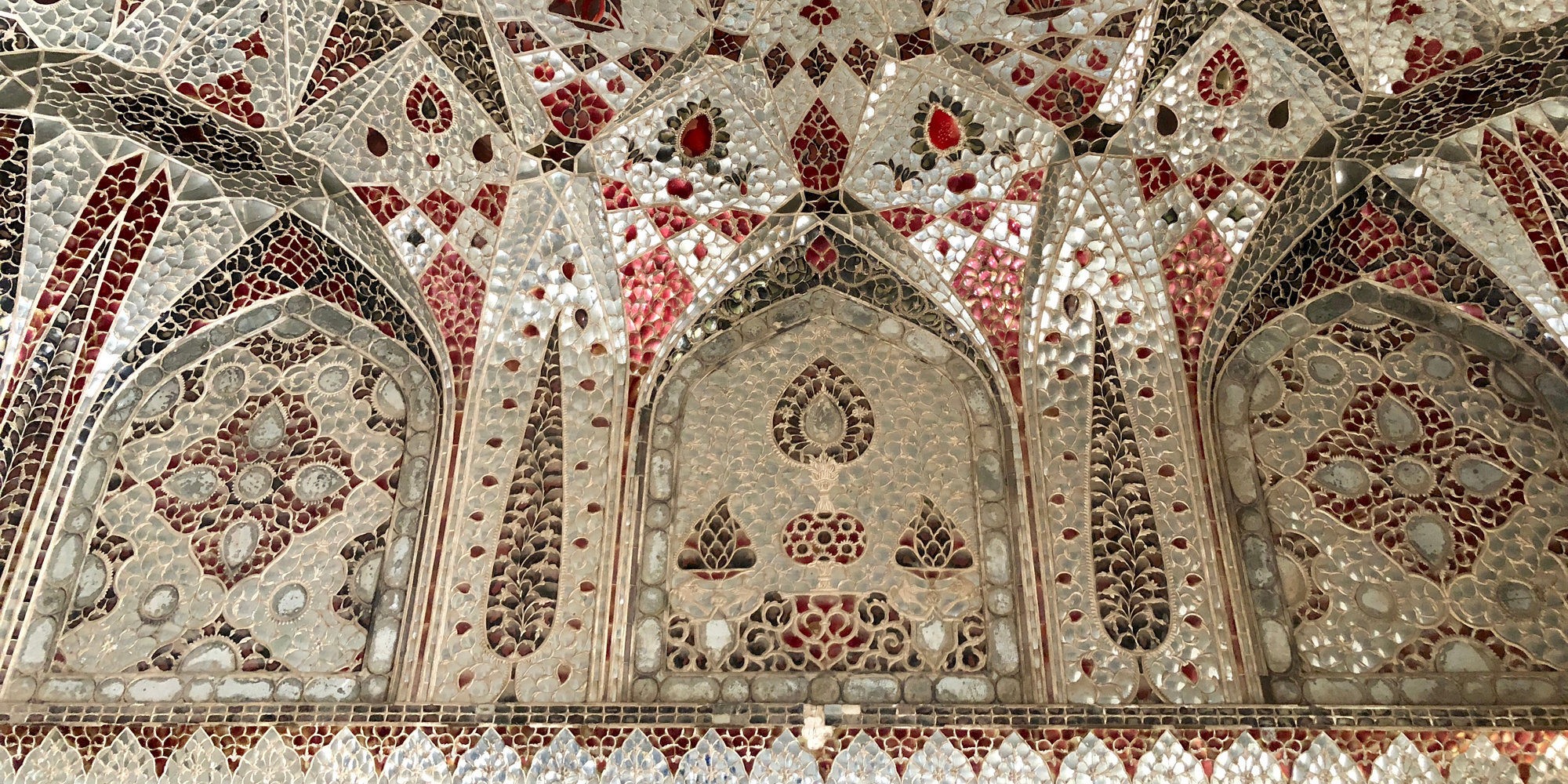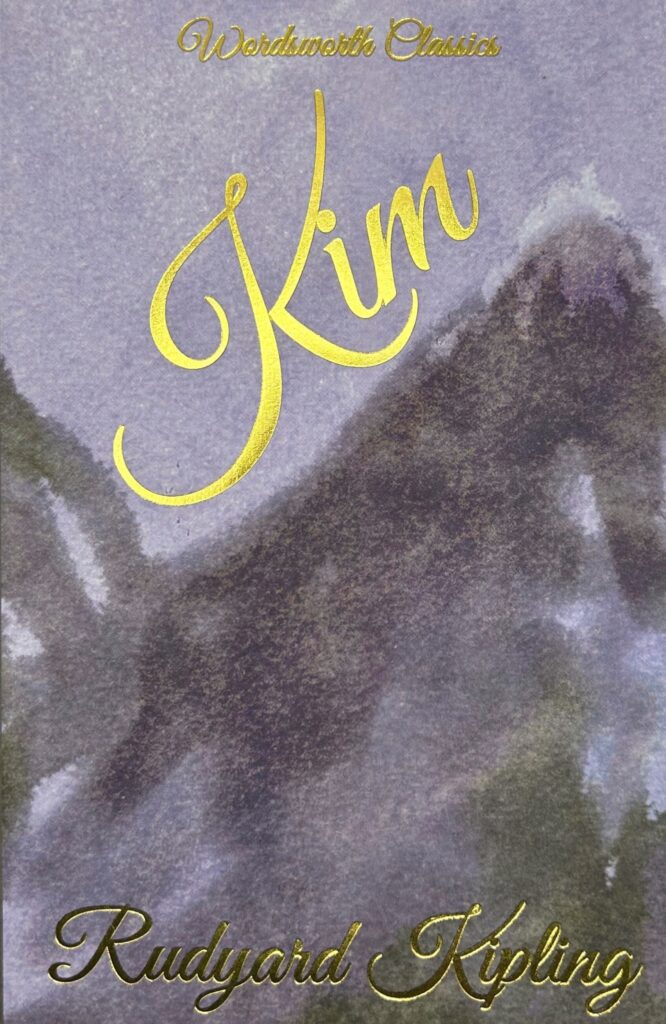
Mia Forbes looks at Kim
Mia Forbes looks at Kim, Rudyard Kipling’s tale of a child growing up in India against the backdrop of ‘The Great Game’, the political conflict between Britain and Russia.
Kim is often counted among the UK’s favourite books[1], but its fans are increasingly likely to find themselves Kipling apologists, defending its author from accusations of racism, colonialism and cultural insensitivity. One needn’t look much further than the first page to find evidence in support of such an interpretation. The thirteen-year-old protagonist, Kimball O’Hara, is introduced sitting astride a great cannon that stands outside the Lahore Museum, a position he won by kicking a young Indian boy off the monument. “There was some justification for Kim…”, we are told, “…since the English held the Punjab and Kim was English.” Read in isolation, such a statement has much the same effect as the opening lines of Kipling’s poem The Ballad of East and West:
“Oh, East is East, and West is West, and never the twain shall meet,
Till Earth and Sky stand presently at God’s great Judgment Seat”
But just as we are forced to revise our first thoughts by the couplet which follows:
“But there is neither East nor West, Border, nor Breed, nor Birth,
When two strong men stand face to face though they come from the ends of the earth!”
So too we are soon made to question our initial impression of Kim as a straightforward celebration of British colonialism. We are told that the young Kim is “burned black as any native” and speaks “the vernacular by preference, and his mother-tongue in a clipped uncertain sing-song”. The orphaned son of an Irish soldier stationed in India in the 1890s, Kim grew up an impoverished, wily, but lovable vagabond in Lahore, living “on terms of perfect equality with the small boys of the bazar”, and coming to be known as “little friend of all the world” by the locals, whom he calls “my people”. Kim has been the object of attempts to find in Kipling’s writing an explicit point of conflict between the power of the British Empire, of which the author has long been considered an exponent, and the indigent and the inferior world of colonial India. The determined effort of some critics to seek such a dichotomy in the novel results in their failure to appreciate and engage with the vivid environment Kipling creates. The novel is multifaceted – its themes diverse, its setting technicolour, and its characters often unfathomable – but not as a series of slides which, stacked neatly on top of one another, can be easily separated and taken apart to study each individual frame. Rather, its layers are tightly glued together in an overlapping melange, and the attempt to wrench them apart threatens to wreck the entire arrangement. The adhesive that binds together the multitude of perspectives, cultures and themes that characterise the novel is Kim himself, and most importantly his youth.
We hear him singing “Thy father was a pastry-cook, Thy mother stole the ghi,” in mockery of his Indian friend, whose father was, in fact, “worth perhaps half a million sterling”. This added detail further confuses our notion of status, superiority and power, but most of all remind us that none of this matters to the thirteen-year-old boy teasing his friend. Aware as he is, in theory, of his privileged position as a white man, ideas of racial superiority or natural rights rarely figure in his thoughts. Seen through Kim’s eyes, the Great Game (the name given to the ongoing tensions between Britain and Russia over the control of India during the 1800s) really becomes more of a game, and distinctions in race, religion and culture are viewed as little more than obvious but inconsequential variations. As Irving Howe recognised, “whatever evil [Kim] does encompass tends to be passed off on to a troop of bumbling Russian spies who muddle along on the northern borders of India, stage-comic Russians about as alarming as Laurel and Hardy”. While not oblivious to them, Kipling chooses not to focus on the political and social questions raised by British rule and instead tells a far more timeless and universal tale.
In the opening chapter, Kim comes across Teshoo Lama, a spiritual traveller in search of the mysterious River of the Arrow, which promises to “wash away all taint and speckle of sin”. He sets out to accompany this man as his chela (or disciple), hoping that along the way he will fulfil his own fate by finding the ‘Red Bull on the green field’, which his father told him would one day bring him honour. Together the unlikely pair run into a series of adventures, intensified when Kim is swept up in the Great Game, acting as a messenger between the British secret service and their native operatives. Their quest is interrupted, however, when they encounter the Irish Mavericks, the regiment to which Kim’s father had belonged, and whose insignia happens to be a red bull emblazoned on a green background. For Kim, the regimental flag had become a prophetic omen; he had turned this standard Western conceit into a mystical ritual, emphasising that while he may be British by blood, our protagonist finds certain features of his motherland just as foreign as Kipling’s targeted audience would have found his descriptions of the Himalayas. This constant push-and-pull between the different cultures makes it impossible to pin down a single familiar viewpoint or perspective, forcing us to engage with the narrative afresh.
After being recognised, the boy is taken to St. Xavier’s, the premier British school in India which promises to make him “a white man, an’, I hope, a good man”. Even St. Xavier’s, however, escapes the stereotypical portrayal we might expect. Aside from a few anecdotes, Kipling glides over most of Kim’s time there, telling us that we “would scarcely be interested in Kim’s experiences as a St. Xavier’s boy among two or three hundred precocious youths”. Even when his school days are described, the place proves to be a far cry from the predictable British institution. The ‘precocious youths’ are not cast in the mould of pompous little Etonians, but like Kim, are boys born and bred in India who “were used to jogging off alone through a hundred miles of jungle, where there was always the delightful chance of being delayed by tigers”. Moreover, the most valuable skills he gains for his future career as part of the secret service are not learnt in the classroom under the instruction of the English elite, but in the games, he plays during his vacation at the labyrinthine house of Lurgan, another mysterious figure with unexplained connections to the Great Game. And so, again, we are made to see this world as Kim sees it, not as a microcosm of imperial politics or an exhibition of the cultural divide, but as a thrilling, yet organic, sequence of events that occur in the course of one boy’s unique adolescence.
When his school years are done, and with “half a year to run without heel-ropes” before joining the secret service, Kim rejoins the Lama, who has funded his education, and the two re-embark upon the quest for the River of the Arrow. Their subsequent adventures in the Indian mountains involve a run-in with some caricatured European spies which shakes the lama’s moral resolve, leaving him physically weakened and mentally dejected. As a result, Kim worries that he has failed to fulfil his role as chela and weeps at the feet of his master, but the lama comforts him by blaming all their troubles on the inherent flaws of the human body. These sorts of sentiments have been expressed by the lama throughout the novel, as he resolves to face difficulties, such as Kim’s departure to St. Xavier’s, with an imperturbable stoicism. In his search for enlightenment, he practices the strictest self-disciple, striving to abstract himself from the physical world and enter into the spiritual realm that constitutes the correct domain of the proper Buddhist monk. And yet, when he finally finds the foretold river and knows that his “Soul had passed beyond the illusion of Time and Space and of Things” he is called sharply back to the real world by the thought of Kim. He wonders what would happen to the boy without him, and decides, “I will return to my chela, lest he misses the Way”.
The Lama turns back from the prospect of Enlightenment, giving up all that he has sought across many years and many miles, and finds contentment instead in his bond with the young boy he has come to consider his grandson. Having advised him throughout the novel to let go of his emotional attachments, we now witness a reversal, as he chooses to move away from the abstract and the spiritual toward powerful feelings of human affection. During his journey, the lama reaches the serene realisation that real healing comes not from isolated asceticism but from love, as we see in the novel’s final lines:
“He crossed his hands on his lap and smiled, as a man may who has won salvation for himself and his beloved.”
The master and his chela each find in one another a sense of peace that transcends the turmoil of their immediate environment, just as Kipling’s focus on their companionship eclipses some of the more weighty themes of political strife and colonial rule. Kim’s childish, though by no means naive, perspective is in constant contrast with the archaising ‘thee’s and ‘thou’s that characterise the author’s style, as well as with the major international confrontation in which he takes part. Kim does not offer us a study of colonial India, nor a report on the inner workings of the Great Game; instead, its curiously charming characters and the unpredictable story serves to remind us of the values and friendship that can be shared by street urchin and wandering monk alike.
[1] 100 Best English-language Novels of the 20th Century, The Modern Library, 1998; ‘The UK’s Best-Loved Novel’, The Big Read, BBC, 2003
Image: Mughal Architecture; details of Lahore Fort, Lahore, Pakistan. Credit: Imran’s Photography / Shutterstock.com
Books associated with this article
